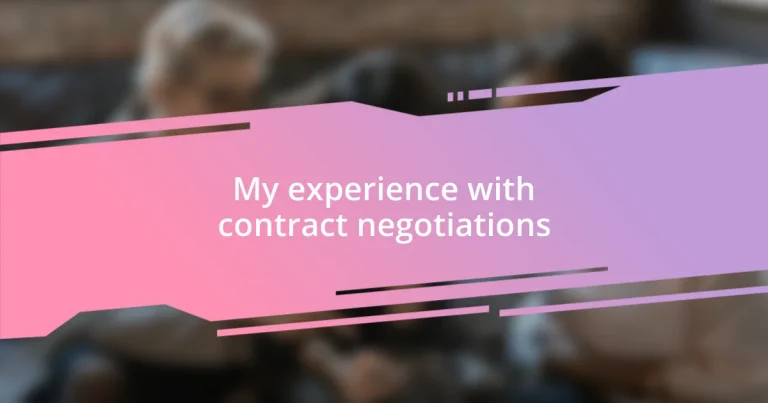Key takeaways:
- Effective negotiation relies on preparation, active listening, and focusing on mutual benefits to create a collaborative environment.
- Common pitfalls include failing to listen actively, not establishing clear boundaries, and making assumptions without clarifying expectations.
- Closing a deal successfully requires confirming mutual commitments, reflecting on key points, and trusting your instincts on timing for finalization.
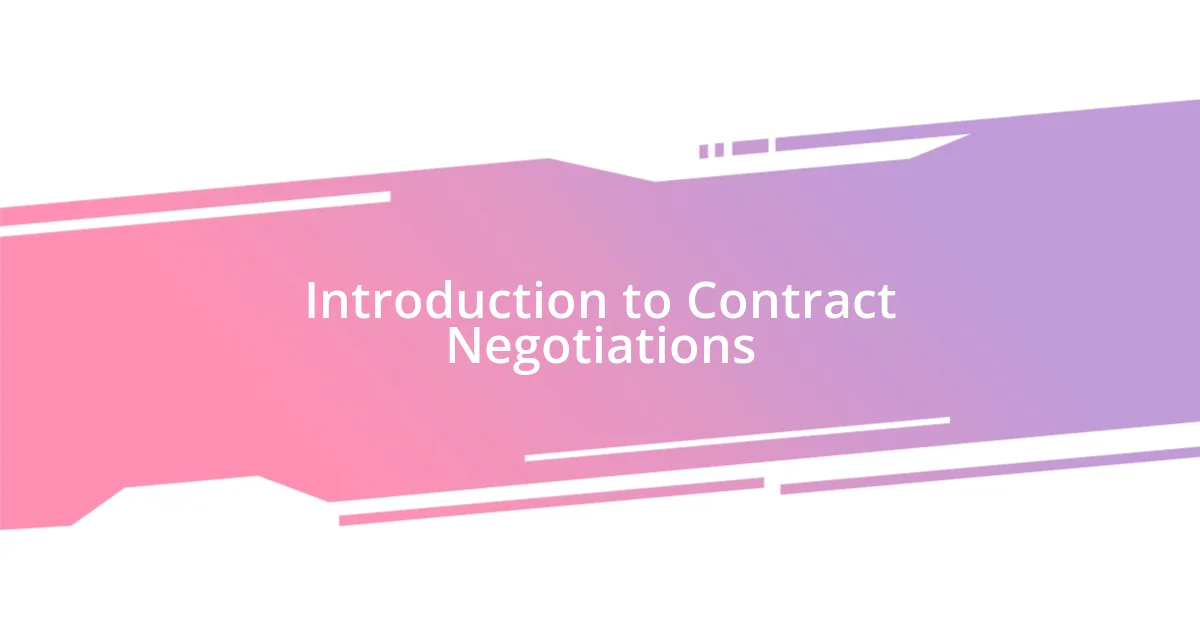
Introduction to Contract Negotiations
Contract negotiations can feel overwhelming, especially when stakes are high. I remember the first time I sat down to negotiate a contract; my palms were sweaty, and my heart raced. It struck me—how could anyone approach negotiations calmly when everything seems to hinge on those discussions?
In my experience, effective negotiation is less about winning and more about collaboration. I learned that asking open-ended questions can illuminate the other party’s priorities, allowing both sides to find middle ground. How often do we enter a negotiation thinking only of our own interests? Shifting the focus to mutual benefits not only eases tension but paves the way for long-lasting partnerships.
Each negotiation teaches something new, such as the necessity of preparation and understanding your counterparts. I recall a particularly challenging negotiation where I realized I hadn’t done my homework—knowing the other party’s motives would have changed the game entirely. Isn’t it fascinating how preparation can be a foundation for success or a pitfall? Engaging with this process deeply not only builds skills but also fosters a sense of confidence for future interactions.
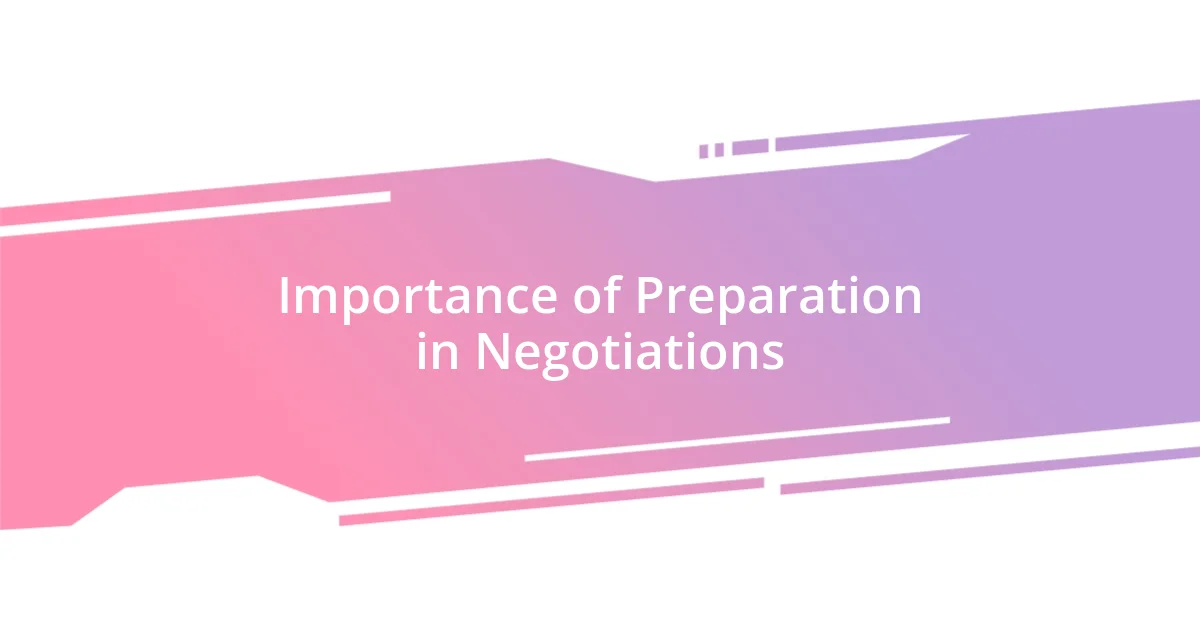
Importance of Preparation in Negotiations
Preparation is the backbone of successful negotiations. I’ve come to appreciate that being well-prepared not only boosts my confidence but also enables me to articulate my needs more effectively. I remember a time when I was negotiating a contract for a freelance project. I spent hours researching the client’s previous projects and even similar market rates. When the discussion began, I could reference specific examples and present my case with clarity. There’s something incredibly reassuring about knowing your facts; it feels like having a safety net.
To emphasize the importance of preparation, consider these points:
- Understanding the Other Party: Knowing their history and motives can redefine your approach.
- Clarifying Your Goals: Clearly defining what you want helps maintain focus during discussions.
- Preparing Alternatives: Having backup options can enhance your bargaining position and reduce stress.
- Ready for Compromise: Anticipating potential counteroffers allows for smoother discussions.
- Building Rapport: Researching mutual interests makes it easier to establish a friendly atmosphere for negotiation.
When I take the time to prepare, I feel empowered and ready to engage in meaningful dialogue. It transforms the negotiation table into a collaborative environment rather than a battleground.
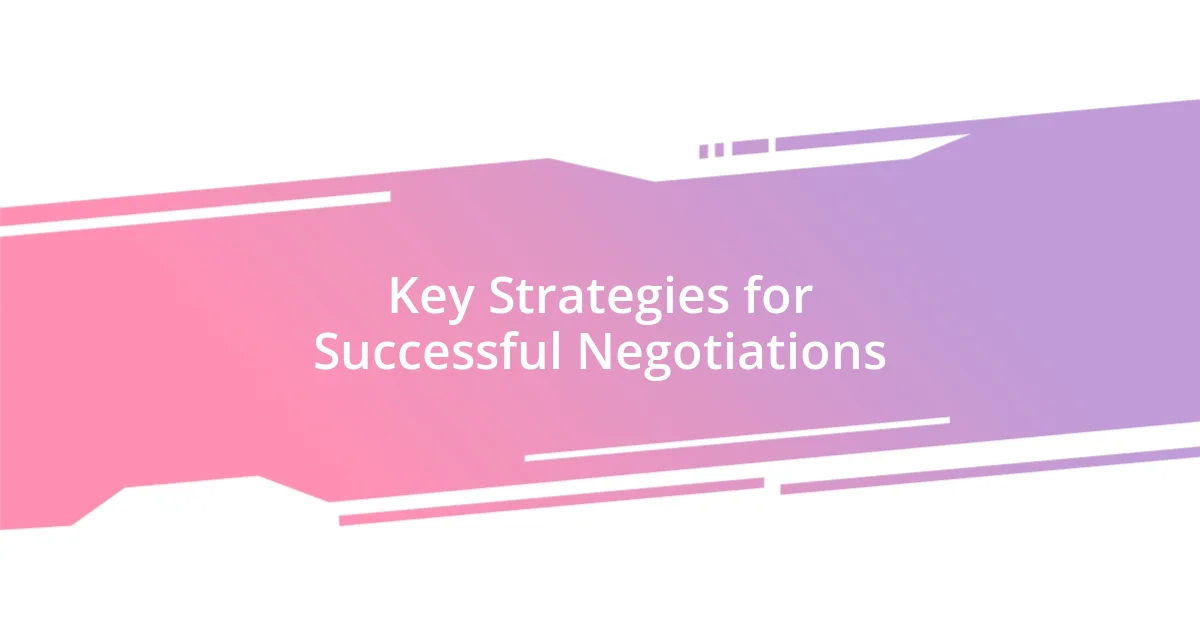
Key Strategies for Successful Negotiations
Effective negotiation strategies are pivotal for both achieving desired outcomes and fostering positive relationships. From my perspective, mastering the art of active listening is crucial. I recall sitting across from a client who seemed initially uninterested. However, by nodding in agreement and asking clarifying questions, I gradually noticed their demeanor change. They began to share insights about their budget constraints, which ultimately led us to a creative solution that worked for both of us. Isn’t it remarkable how a little attentiveness can transform the dynamics of a negotiation?
Another strategy that significantly benefits negotiations is the concept of establishing a win-win scenario. I vividly remember a time when I was negotiating a lease for my office space. Rather than positioning it as a simple transaction, I proposed a longer lease commitment in exchange for lower monthly payments. This approach not only secured my interests but also provided the landlord with reliable long-term income. It’s interesting to see how reframing discussions into mutually beneficial terms can create trust and pave the way for future collaborations.
Lastly, maintaining a positive attitude throughout the negotiation process is vital. I often remind myself that negotiations aren’t personal but rather professional interactions aimed at finding common ground. During a tough negotiation for a project contract, I felt compelled to express my frustrations. But then I took a deep breath and redirected my focus towards shared goals. By keeping the tone light yet purposeful, the atmosphere shifted, and we were able to overcome hurdles more effectively. Isn’t it fascinating how a simple shift in mindset can lead to breakthroughs in discussions?
| Strategy | Description |
|---|---|
| Active Listening | Engaging fully to understand the other party’s needs and concerns. |
| Win-Win Solutions | Creating agreements that benefit both parties involved. |
| Positive Attitude | Maintaining professionalism and optimism to foster rapport. |
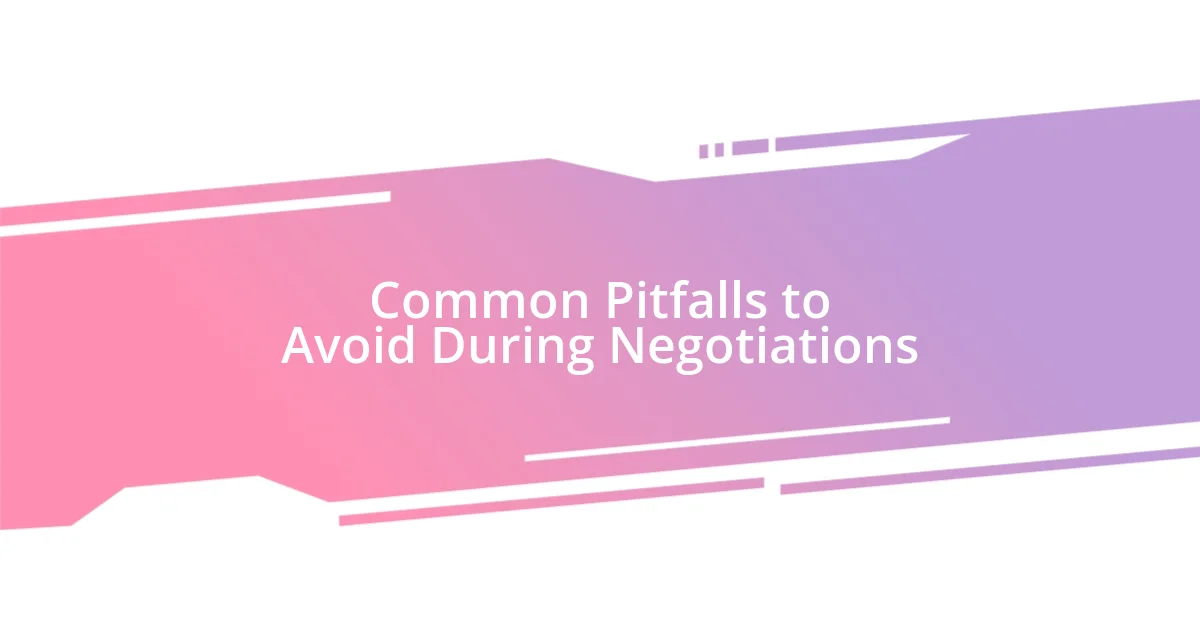
Common Pitfalls to Avoid During Negotiations
One of the most common pitfalls in negotiations is failing to listen actively. I remember a particular negotiation where I was so focused on presenting my viewpoint that I overlooked valuable insights from the other party. The client had some serious concerns about budget constraints, but because I didn’t pay close attention, I missed an opportunity to adjust my proposal to find common ground. Have you ever found yourself so caught up in your own agenda that you neglected to truly hear the other side? It’s a trap I’ve fallen into, and it can lead to misunderstandings that derail the entire negotiation.
Another mistake is not identifying the limits of what you’re willing to accept. Early in my career, I negotiated a contract without setting a clear walk-away point. When the other party made demands that crossed my boundaries, I felt cornered. I hesitated, worried about losing the deal altogether. In retrospect, having a defined ceiling would have empowered me to negotiate with greater confidence. Wouldn’t it be easier if we all walked into negotiations knowing exactly what we could compromise on?
Lastly, I’ve learned the hard way that assumptions can be dangerous. There was a time when I assumed the client’s expectations were aligned with mine based solely on their reputation. As I presented what I thought was a great proposal, I quickly realized it didn’t meet their needs. It felt awkward and disappointing, a reminder that filling gaps with assumptions can backfire. Don’t you think it’s essential to clarify expectations before diving in? Taking the time to ensure everyone is on the same page can save you from unnecessary frustrations later on.
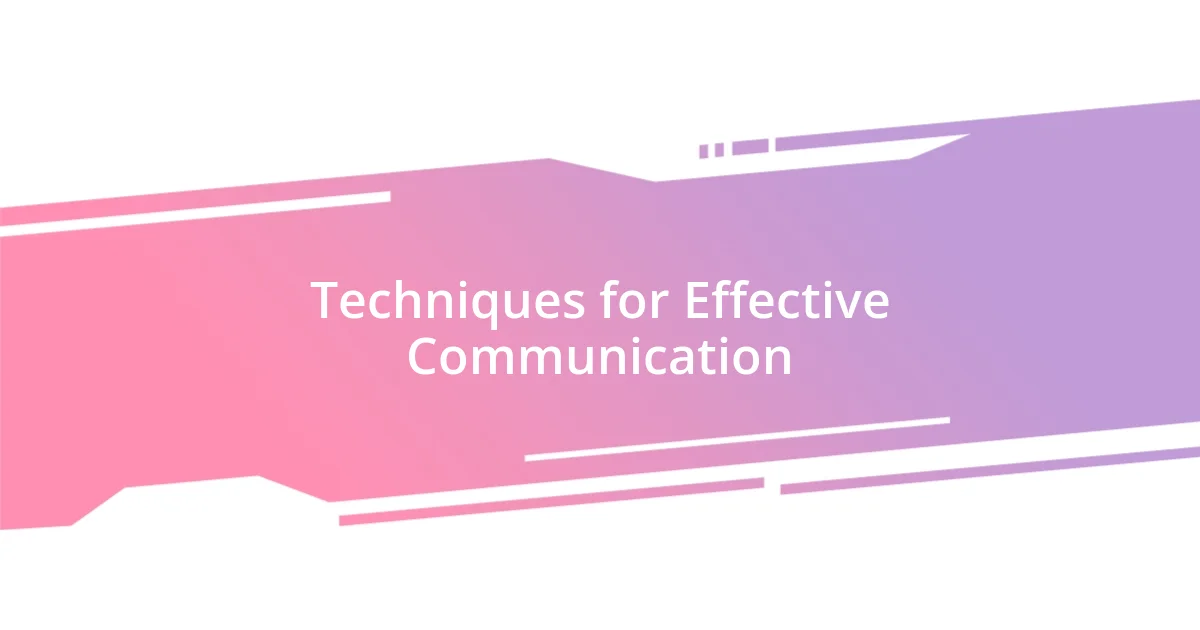
Techniques for Effective Communication
Developing effective communication techniques has been a game-changer for my negotiation experiences. One technique I cherish is asking open-ended questions, which encourages the other party to share their thoughts and insights. I once asked a collaborator, “What are the key challenges you’ve faced with previous contracts?” This simple question led to a deep discussion, revealing potential roadblocks I hadn’t considered. It reminded me how fostering dialogue can uncover hidden concerns and lay the groundwork for cooperation.
Another powerful technique is the use of body language to convey engagement and respect. I recall one negotiation where I made a conscious effort to maintain eye contact and lean slightly forward when the other party spoke. Their reaction was immediate; I could see them relax and engage more openly. It’s intriguing how non-verbal cues can break down barriers and encourage a more open exchange. Have you experienced the difference that a little body language awareness can make?
Finally, summarizing key points throughout the conversation can reinforce understanding and clarity. During a recent contract discussion, I regularly paraphrased what my counterpart was saying to ensure I grasped their intentions and concerns. Towards the end of the meeting, I wrapped up by outlining our main takeaways, which not only mirrored their priorities but also cemented a shared understanding. Isn’t it empowering to leave the table with clear, aligned objectives? This technique has not only improved my negotiation outcomes but also strengthened relationships with all parties involved.
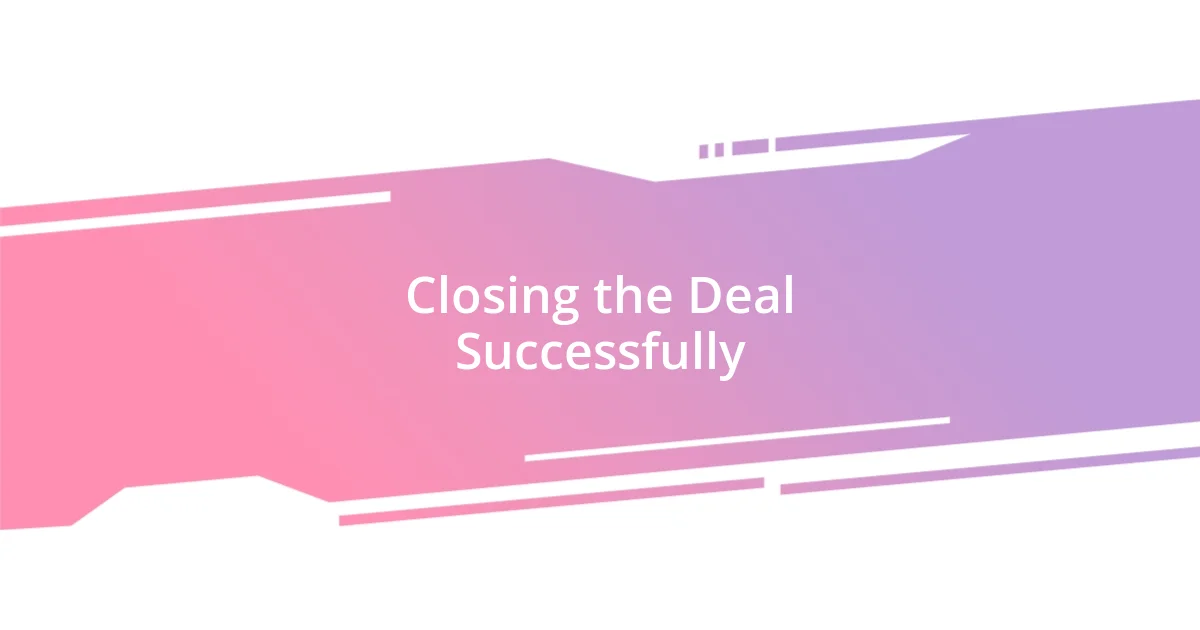
Closing the Deal Successfully
It’s often in the final moments of negotiation where clarity can make or break the deal. I remember a time when I felt the pressure of closing looming over me; the agreement was nearly in hand, yet I was still unsure if all parties were truly satisfied. I took a moment to pause and ask, “Is there anything else we need to discuss before we finalize this?” That simple question opened the door for additional concerns that could have left lingering doubts. It’s amazing how a few moments of reflection can ensure everyone walks away feeling good about the agreement.
Another vital aspect of closing successfully is the art of confirmation. After reaching an agreement, I like to recap our discussion, highlighting the key points that we’ve both settled on. I vividly recall a situation where I meticulously outlined our mutual commitments, and in doing so, it became apparent that we were aligned in our expectations. Isn’t it reassuring to hear everything laid out clearly? This practice doesn’t just close the deal; it solidifies the foundation for a future partnership built on trust and transparency.
When closing the deal, timing is crucial. There’s an instinctive moment when you sense the right time to finalize the agreement. During one negotiation, I felt a shift in the room as my counterpart’s body language relaxed. It was one of those rare moments when you realize it’s time to transition from discussion to closure. I simply said, “Shall we sign this and move forward?” It felt right, and the relief on their face was palpable. Trusting your instincts in that moment can lead to a positive, mutually beneficial closure. Have you ever felt that moment where everything just clicks? It’s what makes the hard work of negotiation worthwhile.
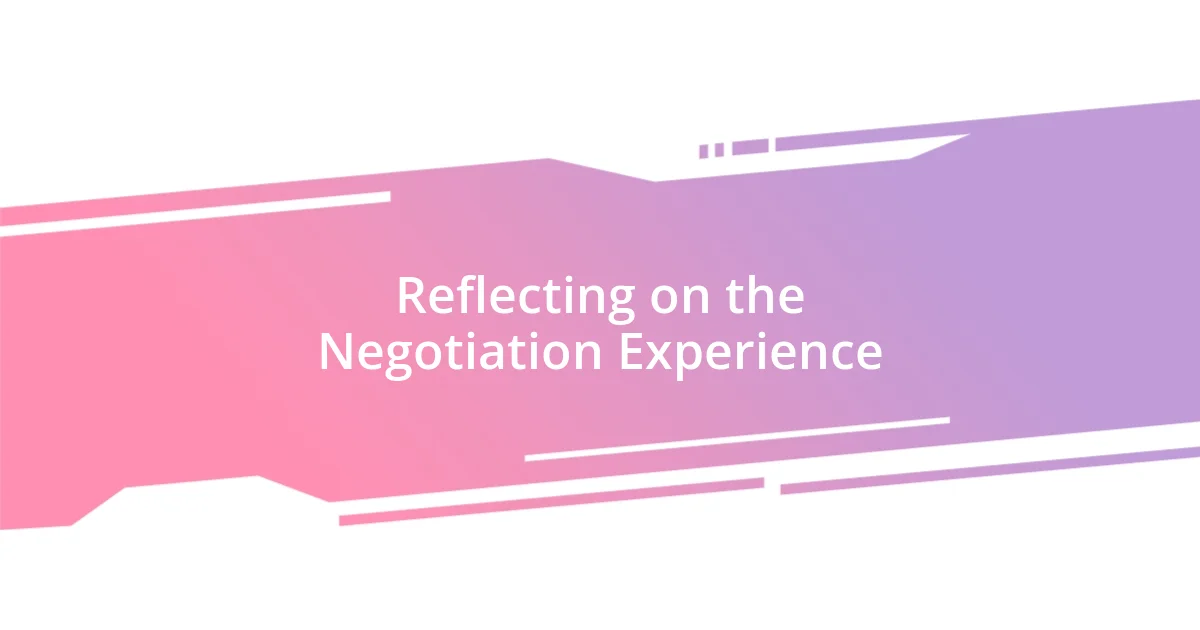
Reflecting on the Negotiation Experience
Reflecting on my negotiation experiences often leads me to appreciate the nuances that shape outcomes. For example, during a drawn-out discussion about contract terms, I found myself revisiting some emotionally charged moments. I remember feeling a mix of anxiety and determination as I navigated through conflicting interests. That tension was a reminder that negotiation isn’t just a transaction; it’s also about understanding people and their motivations at a deeper level.
Looking back, I realize that each negotiation taught me invaluable lessons, especially about adaptability. I once faced an unexpected counter-offer that completely shifted the dynamics. Instead of panicking, I took a deep breath and engaged in real-time thinking, reflecting on how I might adjust my position without losing sight of my core objectives. It’s incredible how adaptable thinking can transform a challenge into an opportunity. Have you ever found yourself in a situation where a sudden change forced you to rethink your strategy on the spot?
Ultimately, reflecting on these experiences emphasizes the importance of cultivating emotional resilience. I recall moments when frustrations flared, yet addressing them openly led to surprising breakthroughs. Acknowledging emotions in negotiations can be a double-edged sword, but when handled well, it fosters authenticity and trust. Isn’t it fascinating how vulnerability in discussions can pave the way for stronger collaborations? This reflection reinforces my belief that the journey of negotiation is as significant as the destination.












